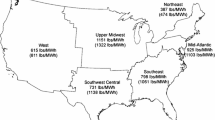Abstract
This paper extends the political economy idea developed by Ackerman and Hassler [Clean Coal/Dirty Air, or How the Clean Air Act became a Multibillion-Dollar Bail-out for High Sulfur Coal Producers and What Should Be Done About It. New Haven: Yale University Press], which suggested that a coalition of environmentalists and industrialists successfully lobbied the US Congress. More strict technology-based standards for new emitting sources than for existing sources was the resulting policy outcome serving the common interest of the coalition because it offered both a barrier to entry for new firms and improved environmental quality. We focus on the case of international climate negotiations and the promotion of wind-based energy. Along the lines of the Ackerman and Hassler approach, we suggest that one reason for EU eagerness to push forward ambitious reduction target levels (and thereby promote new green industries) could be a similar coalition between industrialists and environmentalists. Such a strategy can be seen in the context of the Bootleggers and Baptist theory developed by Yandle [‘Bootleggers and Baptists: the Education of a Regulatory Economist,’ Regulation, 7, 12–16], where the Baptists (in our case the environmentalists) demand changes in behaviour on moral grounds. In contrast, the Bootleggers (the producers of renewable energy), who profit from the very regulation, keep a low profile. The actual heavy subsidisation of renewable energy sources, such as wind energy, can be viewed as a successful policy outcome for the coalition of industrialists and environmentalists offering both market protection and improved environmental quality. Solving the current dead-lock in international climate negotiations may well imply fighting the strong coalition of industrialists and environmentalists. Such a political battle may turn out to be just as tough as fighting windmills and needs to be addressed in future and more rigorous empirical research. At the end of the day, transparent incentives of relevant stakeholders in the climate change issue are necessary preconditions for progress in the climate change negotiations.
Similar content being viewed by others
References
B.A. Ackerman W.T. Hassler (1981) Clean Coal/Dirty Air, or How the Clean Air Act became a Multibillion-Dollar Bail-out for High Sulfur Coal Producers and What Should Be Done About It Yale University Press New Haven
S. Barrett (1990) ‘International Environmental Agreements as Games’ R. Pethig (Eds) Conflicts and Cooperation in Managing Environmental Resources Springer-Verlag Berlin
S. Barrett (1997) ArticleTitleThe Strategy of Trade Sanctions in International Environmental Agreements Resource and Energy Economics 19 345–361
S. Barrett (1998) ArticleTitle‘Political Economy of the Kyoto Protocol’ Oxford Review of Economic Policy 14 IssueID4 20–39
Brandt, U. S. (forthcoming), ‘Unilateral actions, the Case of International Environmental Problems’, Resource and Energy Economics.
U.S. Brandt G.T. Svendsen (2002) ArticleTitle‘Hot Air in Kyoto, Cold Air in The Hague- the Failure of Global Climate Negotiations’ Energy Policy 30 1191–1199
InstitutionalAuthorNameBTM Consult (2001) International Wind Energy Development, World Market Update 2000 Ringkøbing Denmark
InstitutionalAuthorNameBTM Consult (2002) International Wind Energy Development, World Market Update 2001 Ringkøbing Denmark
InstitutionalAuthorNameDanish Economic Council (2002) Danish Economy: Spring 2002 Copenhagen Schultz Grafisk A/S
J. Darmstadter P.D. Teitelbaum J.G. Polach (1971) Energy in the World Economy: A Statistical Review of Trends in Output, Trade, and Consumption since 1925. Resources for the Future, Inc. The Johns Hopkins Press Baltimore, Maryland
A.D. Ellerman P.L. Joskow R. Schmalensee J.P. Montero E.M. Bailey (2000) Markets for Clean Air: The U.S. Acid Rain Program Cambridge University Press Cambridge, UK
EWEA (2002), http://www.ewea.org/doc/20-02-02%20European%20Wind%20Energy-%202001-%20stats.pdf Another Record Year for European Wind Power (access date: 6 July 2002).
J. Gupta L. Ringius (2001) ArticleTitle‘The EU’s Climate Leadership: Reconciling Ambition and Reality’ International Environmental Agreements: Politics, Law and Economics 1 IssueID2 281–99
R.W. Hahn G.L. Hester (1989a) ArticleTitle‘Marketable Permits–Lessons for Theory and Practice’ Ecology Law Quarterly 16 361–406
R.W. Hahn G.L. Hester (1989b) ArticleTitle‘Where did all the Markets Go? An Analysis of EPA’s Emission Trading Program’ Yale Journal of Regulation 6 109–153
M. Hoel (1991) ArticleTitle‘Global Environmental Problems: The Effects of Unilateral Actions Taken by One Country’ Journal of Environmental Economics and Management 20 55–70
IEA (2002), IEA Recommendations on Energy and Sustainable Development, IEA Press (02) 12. Paris, 28 May 2002 http://www.iea.org/new/releases/2002/susdev.htm (access date 28 June 2002).
N. Mabey S. Hall C. Smith S. Gupta (1997) Argument in the Greenhouse: The International Economics of Controlling Global Warming Routledge London
Hansen, J. D., C. Jensen and E. S. Madsen (2002), ‘The Establishment of the Danish Windmill Industry–Was it Worthwhile’, Department of Economic, Aarhus Business School, unpublished manuscript.
OECD (2002), Database on Environmentally Related Taxes, http://wwwl.oecd.org/scripts/taxbase/queries.htm, access date: 6 July 2002.
M.E. Porter (1990) The Competitive Advantages of Nations The Free Press New York
T. Sandler (1997) Global Challenges, an Approach to Environmental, Political and Economic Problems Cambridge University Press Cambridge
G.T. Svendsen (1998) Public Choice and Environmental Regulation: Tradable Permit Systems in United States and CO2Taxation in Europe. New Horizons in Environmental Economics Edward Elgar Cheltenham, UK
G.T. Svendsen (2003) Political Economy of the European Union: Institutions, Policy and Economic Growth Edward Elgar Cheltenham, UK
T.H. Tietenberg (1985) Emissions Trading: An Exercise in Reforming Pollution Policy Resources for the Future Washington, DC
G. Tullock (1967) ArticleTitle‘The Welfare Costs of Tariffs, Monopolies, and Theft’ Western Economic Journal 5 224–232
UN (2002): http://www.un.org/johannesburg/press (access date: October 4, 2002).
E. Woerdman (2001) Limiting Emissions Trading: The EU Proposal on Supplementarity, Draft ECOF Research Memorandum, second/updated version, January 2001 University of Groningen (RuG) Groningen
B. Yandle (1983) ArticleTitle‘Bootleggers and Baptists: The Education of a Regulatory Economist’ Regulation 7 12–16
Yandle, B. (1998), Kyoto, Bootleggers and Baptists. PERC Policy Series, Political Economy Research Center.
Author information
Authors and Affiliations
Corresponding author
Additional information
JEL Classification: Q28,H2, H4
Rights and permissions
About this article
Cite this article
Brandt, U., Svendsen, G. Fighting Windmills: The Coalition of Industrialists and Environmentalists in the Climate Change Issue. Int Environ Agreements 4, 327–337 (2004). https://doi.org/10.1007/s10784-004-2330-5
Accepted:
Issue Date:
DOI: https://doi.org/10.1007/s10784-004-2330-5




